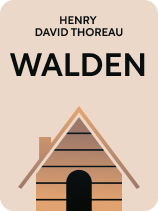

This article is an excerpt from the Shortform book guide to "Walden" by Henry David Thoreau. Shortform has the world's best summaries and analyses of books you should be reading.
Like this article? Sign up for a free trial here.
What did Henry David Thoreau find “wearisome and dissipating”? What did he learn from his time at Walden Pond? What did he consider “the treasured wealth of the world”?
In the 1840s, Henry David Thoreau built a cabin at Walden Pond, on the outskirts of Concord, and lived there for two years. More than 160 years after Walden was first published in 1854, people still read Thoreau’s book about the life he lived, alone, in the woods of eastern Massachusetts.
Continue reading for seven Henry David Thoreau quotes from Walden that will give you a good sense of the book.
Henry David Thoreau Quotes From Walden
We still read Walden because of what Thoreau accomplishes on the page. Watching the seasons pass, Thoreau articulated his philosophy that you can build a more meaningful life not through constant work and endless consumption, but through living in harmony with the natural world and with your values.
We’ve collected several Henry David Thoreau quotes from Walden and added a bit of context and explanation to help you understand his ideas.
“I learned this, at least, by my experiment: that if one advances confidently in the direction of his dreams, and endeavors to live the life which he has imagined, he will meet with a success unexpected in common hours.”
One of Thoreau’s motivations for going to Walden involved his confidence in his own choices and his belief that he needed to trust his intuition: He felt that moving to the woods was the right choice for him, so he followed his own path. Thoreau contends that we’re all capable of living moral and meaningful lives if we follow our intuitions and honor our convictions. He writes that there are “higher laws” than those of human society. By distancing himself from the city, even by a short walk through the woods, he could more easily live according to his own values.
“I find it wholesome to be alone the greater part of the time. To be in company, even with the best, is soon wearisome and dissipating. I love to be alone. I never found the companion that was so companionable as solitude.”
Another of Thoreau’s reasons for living in the woods was to experience solitude, which he defined as spending time by himself without feeling alone. According to Thoreau, solitude enables us to find meaning and spiritual purpose. True solitude is also an antidote to a kind of loneliness that Thoreau contends is far too common in society. He argues that people feel more lonely when they spend too much time in society than when they spend time alone, deeply absorbed in their work, in the way that farmers or students become immersed in their tasks. That said, while Thoreau sought solitude, he also believed that he could reap the benefits of time spent alone without being a hermit.
“Books are the treasured wealth of the world and the fit inheritance of generations and nations.”
Reading occupied a significant part of Thoreau’s time in Walden Woods. Thoreau regarded reading as work that’s worthy and meaningful, like cultivating his bean field. He came to believe that his cabin was a more suitable place for serious thought—and serious reading—than a university. As for what Thoreau regarded as serious reading, he contended that more people ought to read the classics in their original languages—or at least select literature that was more substantive than the simple novels that he complains were popular at the time.
“We need the tonic of wildness. … At the same time that we are earnest to explore and learn all things, we require that all things be mysterious and unexplorable, that land and sea be indefinitely wild, unsurveyed and unfathomed by us because unfathomable. We can never have enough of nature.”
Observing the natural world occupied much of Thoreau’s time. He paid close attention to the animals who lived in the woods, near the pond, and even in various crevices of his cabin. (He mentions a hare who built a nest under his floor, as well as wasps who settled in his windows and walls ahead of the cold Massachusetts winter.) It wasn’t just animals who occupied his attention. Thoreau also became familiar with memorable trees in the area, and he observed how the ponds froze in the winter and thawed in the spring.
“Live in each season as it passes; breathe the air, drink the drink, taste the fruit, and resign yourself to the influence of the earth.”
A second reason that Thoreau moved to Walden Pond was to live a life attuned to the natural world, rather than set to the rhythm of life in town. He writes that modern society alienates us from the natural world. But staying in touch with the natural world—with its endless cycle of seasonal change and growth—can inspire us, awaken us, and sustain us both physically and spiritually, he contends.
“My greatest skill has been to want but little.”
Thoreau explains that the choices he made in moving to Walden were motivated by a desire to live more simply—and he doesn’t hesitate to say that he thinks his readers should simplify their lives, too. During the two years he lived in the woods, Thoreau chose a life of what he calls “voluntary poverty.” He reduced what he produced and consumed to just what was necessary for survival: food, shelter, clothing, and fuel.
“A man is rich in proportion to the number of things which he can afford to let alone.”
While Thoreau believed there is dignity in labor and in working to provide for oneself, he contended that people consume too much and work too much to pay for it. He explains that people can live on much less than they think possible. Then, with that change in perspective, they can stop overworking themselves to afford a large home, a vast family farm, fashionable clothes, or even an expensive education. Thoreau contends that the drive to acquire these and other material things results in unacceptable costs in terms of time: time that we give up for truly living in order to obtain possessions that aren’t necessary and don’t fulfill us.

———End of Preview———
Like what you just read? Read the rest of the world's best book summary and analysis of Henry David Thoreau's "Walden" at Shortform.
Here's what you'll find in our full Walden summary:
- The philosophy behind Henry David Thoreau's classic novel
- How you can build a meaningful life by living in harmony with nature
- A look at how Thoreau spent his time at Walden Pond, outside the book






